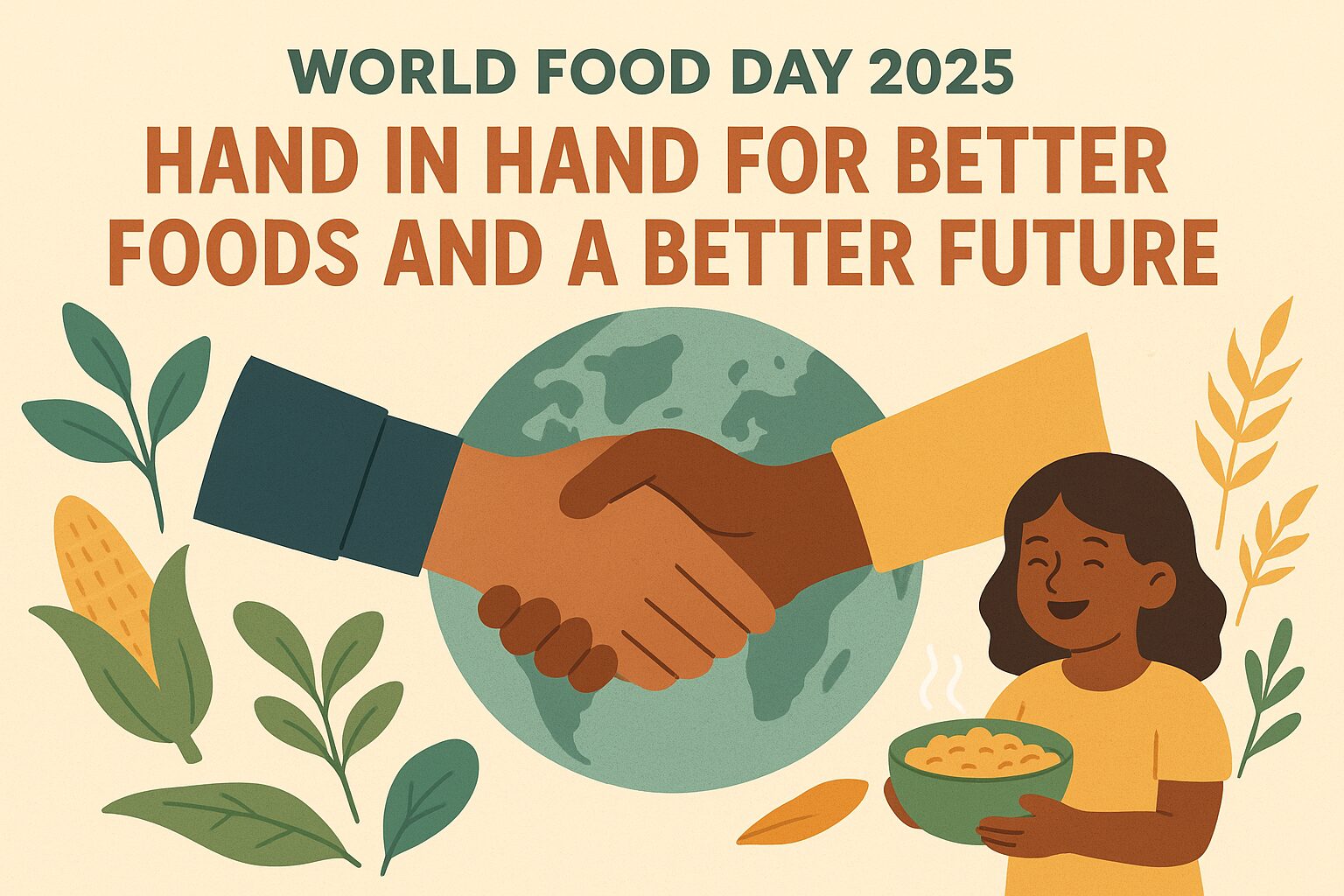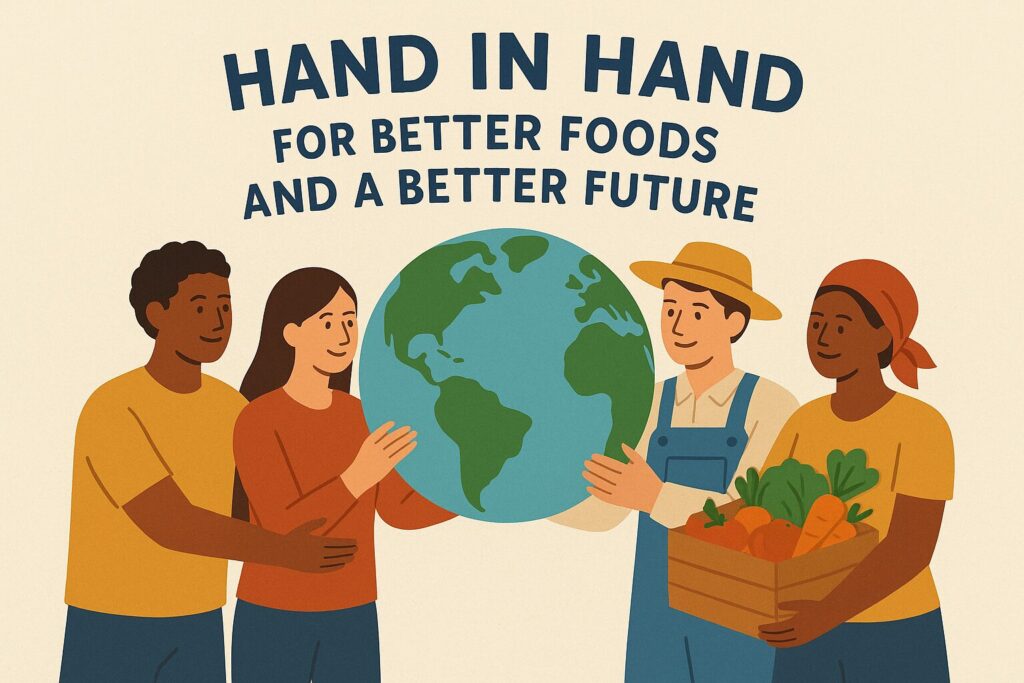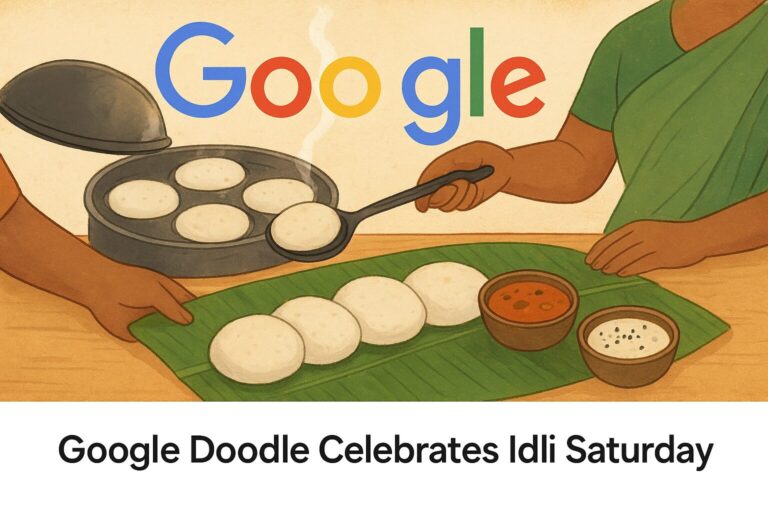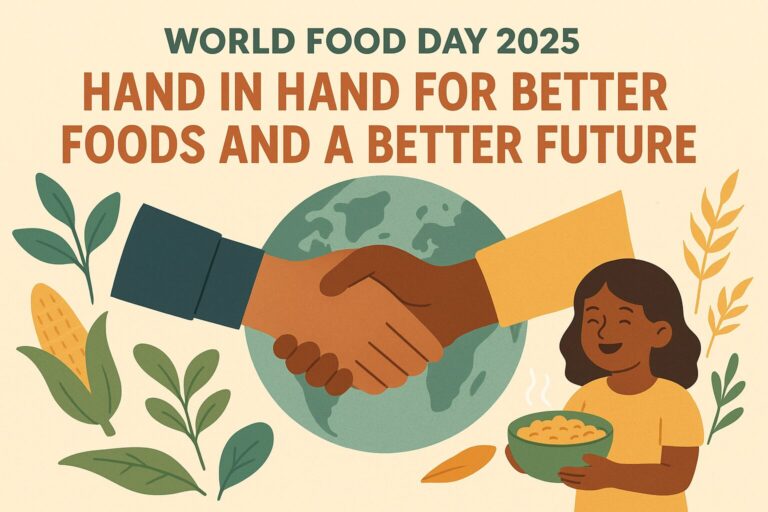
World Food Day 2025- Hand in Hand for Better Foods and a Better Future
Food is not just a necessity- it is life’s most basic right. Every grain tells a story of labor, earth, and hope. Each year, World Food Day reminds the global community of the urgent need to ensure that everyone, everywhere, has access to nutritious food. Celebrated every year on 16 October, it marks the founding anniversary of the Food and Agriculture Organization (FAO) in 1945.
In 2025, as FAO celebrates its 80th anniversary, the theme “Hand in Hand for Better Foods and a Better Future” captures the global call for unity and shared responsibility in building sustainable food systems and achieving Zero Hunger.
History and Significance of World Food Day
World Food Day was established in 1979 during the 20th FAO Conference, proposed by former Hungarian Minister Dr. Pál Romány. The idea was simple but powerful to dedicate a global day to raise awareness about hunger, malnutrition, and the importance of global food security.
The first official celebration took place in 1981, and since then, over 150 countries have participated every year through seminars, campaigns, exhibitions, and food drives.
Its goal is not only to combat hunger but also to educate and inspire action on issues like:
- Food waste and loss
- Climate change and agriculture
- Nutrition and diet quality
- Sustainable food production
Theme of World Food Day 2025
“Hand in Hand for Better Foods and a Better Future”
The 2025 theme encourages collaboration between nations, organizations, and individuals. It reflects the idea that fighting hunger and improving food systems is not a solo mission it requires collective effort.
The meaning behind the theme:
- “Hand in Hand” → symbolizes unity, solidarity, and collective responsibility.
- “Better Foods” → emphasizes nutrition, safety, and affordability over just food quantity.
- “Better Future” → promotes sustainability and protecting natural resources for coming generations.
This theme aligns with United Nations Sustainable Development Goal 2: Zero Hunger, aiming to end hunger by 2030.
Global Challenges in 2025
Despite advances, the world still faces deep inequalities in food access:
- Over 650 million people go hungry every night.
- Nearly 1 billion people are overweight or obese due to poor diet choices.
- 1/3rd of global food is wasted or lost before reaching consumers.
- Climate change continues to damage crops and natural ecosystems.
World Food Day 2025 calls for transforming global food systems to make them fair, sustainable, and resilient.

How the World Celebrates World Food Day
Celebrations occur globally across FAO member nations through different initiatives:
International Level (FAO Headquarters, Rome)
- Official World Food Day Ceremony attended by global leaders, farmers, and youth representatives.
- World Food Forum 2025, discussing innovation and climate-smart agriculture.
- Global campaigns promoting nutrition, sustainable farming, and equal food access.
In India and Other Countries
- Schools organize debates, drawings, and essay competitions.
- Colleges and NGOs host food donation drives and awareness walks.
- Restaurants and brands introduce sustainable, healthy menu options.
- Farmers’ markets and exhibitions promote local produce and traditional food systems.
Simple Ways You Can Contribute
As an Individual:
- Eat locally grown and seasonal foods.
- Reduce food waste- reuse, recycle, and compost.
- Share awareness through social media using #WorldFoodDay2025.
- Cook nutritious, plant-based meals.
- Volunteer with food distribution programs.
As a School or College:
- Organize World Food Day assemblies or exhibitions.
- Start a small school garden to teach food growth cycles.
- Host quiz or essay competitions on healthy diets.
- Encourage “zero food waste” lunch days.
As an Organization or Business:
- Partner with NGOs to reduce food waste.
- Support local farmers and fair-trade produce.
- Introduce healthy meals in canteens.
- Promote awareness among employees.
Building a Sustainable Food Future
Creating a food-secure world requires collective efforts in:
- Sustainable farming — use of organic and water-efficient methods.
- Food storage and logistics — minimizing post-harvest losses.
- Nutrition education — promoting balanced diets among youth.
- Technological innovation — digital monitoring of crops and food supply chains.
- Community empowerment — supporting small-scale farmers and women producers.
World Food Day Themes (1981–2025)
| Year | Theme | Focus Area | Global Message |
|---|---|---|---|
| 2025 | Hand in Hand for Better Foods and a Better Future | Global Cooperation | Encourages partnerships for sustainable food systems and collective well-being. |
| 2024 | Water is Life, Water is Food- Leave No One Behind | Water Sustainability | Emphasized the importance of water in agriculture, food production, and equity. |
| 2023 | Water is Life, Water is Food | Water Management | Promoted water conservation as the foundation of healthy ecosystems and food security. |
| 2022 | Leave No One Behind | Equality & Inclusion | Focused on reducing hunger by ensuring fair access to food for every person. |
| 2021 | Safe Food Today for a Healthy Tomorrow | Food Safety | Highlighted how healthy, safe food builds stronger futures. |
| 2020 | Grow, Nourish, Sustain. Together. Our Actions are Our Future. | Sustainability | Urged global unity for eco-friendly farming and nutrition for all. |
| 2019 | Our Actions Are Our Future: Healthy Diets for a #ZeroHunger World | Nutrition | Advocated for balanced diets and lifestyle changes to end hunger. |
| 2018 | Our Actions Are Our Future: A #ZeroHunger World by 2030 is Possible | Zero Hunger | Promoted SDG 2-eliminating hunger through collective action. |
| 2017 | Change the Future of Migration: Invest in Food Security and Rural Development | Rural Development | Linked migration challenges to food insecurity and rural poverty. |
| 2016 | Climate is Changing. Food and Agriculture Must Too. | Climate Change | Encouraged adaptation of agriculture to changing climate conditions. |
| 2015 | Social Protection and Agriculture: Breaking the Cycle of Rural Poverty | Poverty Alleviation | Called for combining welfare and farming initiatives to end hunger. |
| 2014 | Family Farming: Feeding the World, Caring for the Earth | Family Farming | Recognized small farmers as key to sustainable global food systems. |
| 2013 | Sustainable Food Systems for Food Security and Nutrition | Food Systems | Urged transformation toward sustainability in food production. |
| 2012 | Agricultural Cooperatives- Key to Feeding the World | Cooperatives | Promoted collective farming for empowerment and productivity. |
| 2011 | Food Prices- From Crisis to Stability | Economic Stability | Addressed the need for stable markets to ensure affordable food. |
| 2010 | United Against Hunger | Global Unity | Encouraged people and nations to unite against world hunger. |
| 2009 | Achieving Food Security in Times of Crisis | Crisis Response | Called for resilience and cooperation during economic challenges. |
| 2008 | World Food Security: The Challenges of Climate Change and Bioenergy | Climate & Energy | Highlighted threats from biofuels and climate change to food systems. |
| 2007 | The Right to Food | Human Rights | Declared access to food as a universal human right. |
| 2006 | Investing in Agriculture for Food Security | Agricultural Investment | Advocated for strong investment in rural development. |
| 2005 | Agriculture and Intercultural Dialogue | Cultural Exchange | Encouraged global understanding through agricultural partnerships. |
| 2004 | Biodiversity for Food Security | Biodiversity | Celebrated biodiversity’s role in nutrition and ecosystem balance. |
| 2003 | Working Together for an International Alliance Against Hunger | Global Cooperation | Promoted partnerships to end hunger across all nations. |
| 2002 | Water: Source of Food Security | Water Resources | Linked water management to sustainable food supplies. |
| 2001 | Fight Hunger to Reduce Poverty | Poverty Reduction | Stressed food security as key to economic and human development. |
| 2000 | A Millennium Free from Hunger | Global Goals | Called for a hunger-free 21st century. |
| 1999 | Youth Against Hunger | Youth Empowerment | Encouraged youth involvement in food security initiatives. |
| 1998 | Women Feed the World | Women Empowerment | Recognized women as central figures in farming and nutrition. |
| 1997 | Investing in Food Security | Sustainable Development | Focused on resource allocation to eliminate hunger. |
| 1996 | Fighting Hunger and Malnutrition | Nutrition | Addressed food availability and health as twin global goals. |
| 1995 | Food for All | Equality | Aimed to make nutritious food universally accessible. |
| 1994 | Water for Life | Environment | Emphasized conservation of natural resources for future generations. |
| 1993 | Harvesting Nature’s Diversity | Ecosystem Health | Highlighted the link between biodiversity and food systems. |
| 1992 | Food and Nutrition | Public Health | Focused on balanced diets and improved nutrition policies. |
| 1991 | Trees for Life | Environment | Connected forests with food and ecological balance. |
| 1990 | Food for the Future | Sustainability | Encouraged long-term food planning for growing populations. |
| 1989 | Food and the Environment | Eco Awareness | Linked agriculture to environmental care. |
| 1986 | Fishermen and Fishing Communities | Marine Resources | Honored fishing communities as key to food security. |
| 1984 | Women in Agriculture | Gender Equality | Acknowledged women’s contribution to food systems. |
| 1982 | Food Comes First | Food Priority | Stressed food as the basic right and need of every human. |
| 1981 | Food Comes First | Global Priority | Marked the start of World Food Day with a focus on ending hunger. |
India’s Role in Promoting Food Security
India contributes significantly to global food efforts through:
- PM POSHAN (Mid-Day Meal Scheme): feeding over 100 million children daily.
- Eat Right India Movement: promoting balanced diets and safe food practices.
- National Food Security Act: ensuring subsidized food grains for millions of families.
- Krishi Vigyan Kendras (KVKs): spreading sustainable farming education.
These initiatives align India’s efforts with the global Zero Hunger mission.
World Food Day and the Sustainable Development Goals
World Food Day supports multiple UN SDGs, especially:
- SDG 2: Zero Hunger
- SDG 3: Good Health and Well-being
- SDG 12: Responsible Consumption and Production
- SDG 13: Climate Action
- SDG 17: Partnerships for the Goals
Improving food systems means improving everything from the environment to economy and health.
Conclusion:
World Food Day 2025 reminds us that food is more than nourishment- it’s a bond that connects people, culture, and the planet.
By standing “Hand in Hand for Better Foods and a Better Future,” we promise to fight hunger, reduce waste, and respect the earth that feeds us.
The change begins with one plate, one meal, one action and your hand can make the difference.
Also read: Google Doodle Celebrates Idli Saturday Honoring India’s Famous South Indian Dish






